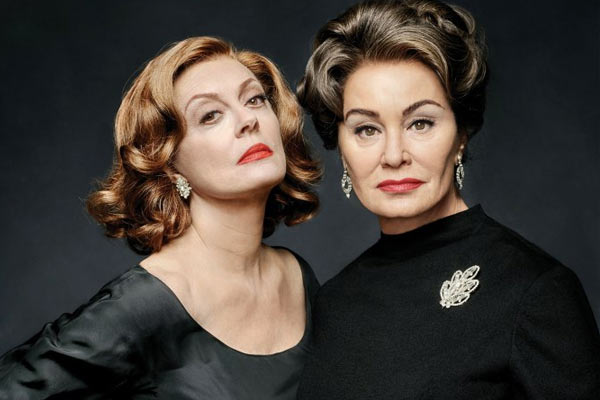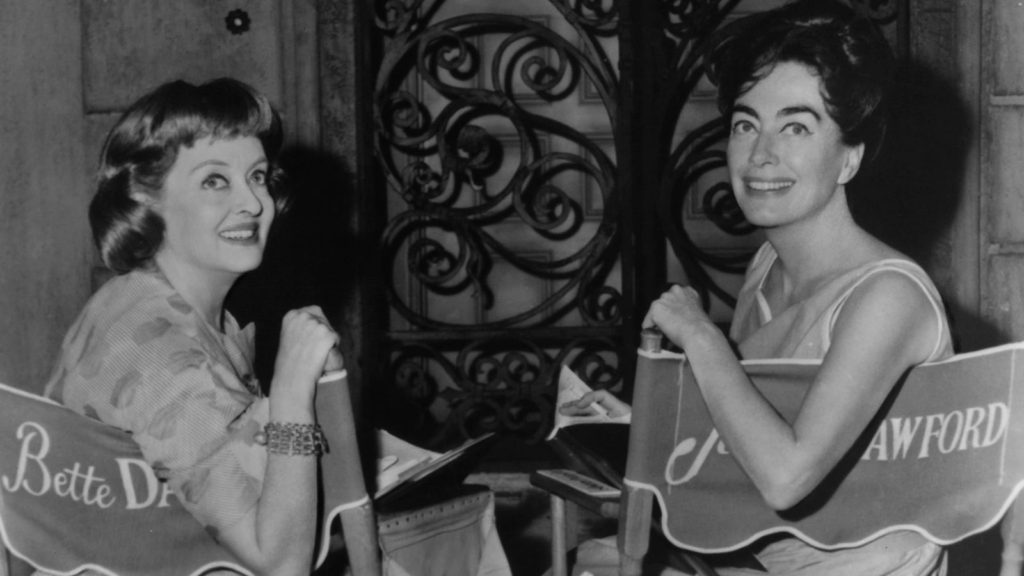In the last scene Jessica Lange (Joan Crawford) and Susan Sarandon (Bette Davis) appear in together, Crawford says, “I’m sorry I wasn’t more generous with you.” Davis replies, “I wish I’d been a friend to you.”
But these words were never actually uttered in real life.
For viewers of Ryan Murphy’s Feud: Bette and Joan, Crawford’s dream sequence with Davis, Jack Warner and Hedda Hopper made for some fitting closure, but it’s a fabricated exchange. One that everyone watching, and probably even Crawford and Davis at the time, wished was reality.
In the series finale fittingly entitled “You Mean All This Time We Could Have Been Friends?” (a quote from Whatever Happened to Baby Jane?), we’re taken on a journey from 1969 through 1978, ultimately ending with Crawford’s death. Although the two rivals never spoke again (we see Davis attempting to call Crawford, but she doesn’t muster the courage to speak), we catch glimpses of each actress’s regrets over how the feud was handled. Even when Davis is finally told that Crawford has passed, she utters: “My mother always said don’t say anything bad about the dead; only say good. Joan Crawford is dead. Good!” Sarandon plays this moment with such conflicted feeling and masked melancholy that we don’t believe her words for a second. Did Davis really mean what she said in real life? Who knows. But here, it’s masterfully layered acting by Sarandon, and exactly on par with what we’ve been served for the entire 8-episode run.
Despite whatever remorse Davis may or may not have felt upon Crawford’s death, Hollywood had chosen its storyline and also, the fate of these now cast aside actresses. The misogyny of Old Hollywood had been on display since the beginning—pitting the women against each other for the sake of a B-movie and spreading rumors to fuel the fire. What Feud makes abundantly clear is how Davis and Crawford were mere pawns in the whole shebang, i.e., the manipulation and ill-will of an old system run by men with no regard to the talent whatsoever. As the show progressed, we see just how similar the two were—with their feelings and aspirations pretty much mirroring each other’s.
One telling scene occurred in episode seven after a dramatic spat on set for Hush…Hush, Sweet Charlotte. Davis asks Crawford, sincerely, “How did it feel to be the most beautiful girl in the world?” Crawford replied, “It was wonderful. The most joyous thing you could ever imagine….and it was never enough.” Crawford reversed the question to her co-star, asking how it felt to be the most talented. Davis replied, “Great. And it was never enough.”
TV magic.
Feud has shined a spotlight on the injustices that these Hollywood actresses had to suffer to make it big, only to later be cast aside once they aged. The finale showed Crawford taking a job as a scientist in a monster picture, only to have it end up being a schlocky mess. It would be her last role. Davis was shown filming eight pilots only to have none of them picked up. Despite their tremendous talents, the machine that pitted them against each other now decided it would no longer need them…that neither actress was a star on her own without the feud of a century in the headlines. It truly was a man’s world…and in many ways still is.
While I’d love to discourse about how Hollywood has improved, how something like this would never happen to women in 2017, I’m not that naïve…or stupid. Women still haven’t reached the respect of equal pay, which is mind-blowing—both inside and outside the entertainment industry. However, I’d like to remain hopeful that we, as a society, might not cast actresses aside so fast anymore. That we will continue to celebrate talent in the face of ageism and sexism, and respect living legends no matter their age, race or sex. I wonder how a feud like this would’ve panned out today. Would it be squashed faster thanks to open dialogue and social media, or would it be an even bigger firestorm because of the newfound digital rumor mill that is the internet? I don’t know. What I do know is that there’s a lot to unpack from the tragic story of Davis and Crawford, and hopefully, Hollywood will eventually learn to be more inclusive and less manipulative. But that may be some downright wishful thinking.
In the show’s final scene, we revert back to day one on set of Baby Jane. Davis and Crawford are sitting in directors chairs, laughing, smiling, and seemingly enjoying each other’s company. As the two part ways to prep for their first read-through, Crawford says, “Bette, here’s what I really hope from this picture when all is said and done. I hope I’ve made a new friend.”
“Me too,” Davis replied.
If only.
Grade: A





I enjoyed this show a lot. Jessica Lange really made me hate Joan Rivers! It was also nice to see Sally Draper in a role again!